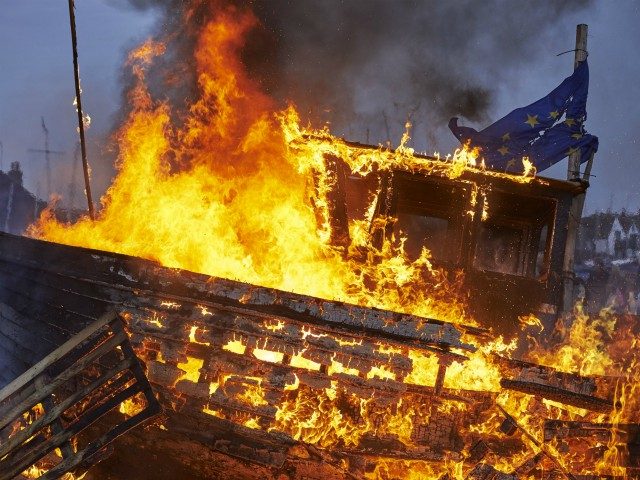The European Union is refusing to discuss a treaty on fishing unless the United Kingdom abandons its claim of full sovereignty over its own territorial waters.
Currently, under the Common Fisheries Policy (CFP), fishermen from the EU27 land more than 60 per cent of fish in Britain’s waters. The French, for example, are legally allowed to catch 84 per cent of Britain’s cod caught in the English Channel and two-thirds of British Irish Sea haddock. While the UK wants to take back full control of its territorial waters and agree on annual fishing licences with EU countries, Brussels is demanding long-term pledges.
Sources speaking to The Times have said that the European Union’s chief negotiator, former French minister Michel Barnier, will only agree to “minor changes to the historic track record” which has been in place since the 1970s, with any deviations from the current system a “no go”.
“The EU has always said that fishing is a key issue for resolution but has subsequently declined to discuss it,” a source told the newspaper of record on Tuesday.
“We had hoped to make progress and presented room papers but, unfortunately, the EU refused to engage due to their self-imposed requirements,” he added, in reference to the EU’s policy on “parallelism”, where Barnier will not talk on single issues unless the UK makes significant concessions to the bloc.
“There is a need for more realism from the EU on the scale of the change that results from our leaving the EU. This is not a request but the legal default under international law,” the source added.
Barnier Calls For EU Member States to be ‘Cold Blooded’ in Brexit Negotiations https://t.co/yTIVI7IwQC
— Breitbart London (@BreitbartLondon) August 25, 2020
France’s foreign minister, Jean-Yves Le Drian, complained that the UK reasserting full national sovereignty while still seeking a deal with the protectionist European Union was “unrealistic”. He said on Monday: “Negotiations are not advancing due to the intransigent and frankly unrealistic attitude of the UK.”
Boris Johnson’s government hit back at the EU. A spokesman told the Evening Standard: “We have been clear from the outset about the principles underlying the UK approach: we are seeking a relationship that respects our sovereignty and which has a free trade agreement at its core, similar to those the EU has already agreed with like-minded countries.
“However, the EU is still insisting not only that we must accept continuity with EU state aid and fisheries policy, but also that this must be agreed before any further substantive work can be done in any other area of the negotiation, including on legal texts, making it unnecessarily difficult to make progress.”
Anglosphere Win: Former Australian PM Tony Abbott To Head UK’s Post Brexit Trade Board https://t.co/UWxoELrL9m
— Breitbart London (@BreitbartLondon) August 26, 2020
The UK officially left the EU on January 31st, 2020, but remains tied to the bloc’s rules and regulations in the ‘transition period’ until December 31st, 2020. If a deal is not struck by then, the UK will deal with the bloc on World Trade Organization (WTO) terms; though, in reality, the two parties have until the end of this month to make a deal in time for it to be ratified by the European Parliament in October.
The Times reports that if the European force a no-deal, the Royal Navy may find itself clashing with Danish, French, and Spanish fishermen in the protection of British waters. In June, British fishermen revealed they anticipate the government will refuse to back down, resulting in clashes with French fishermen in the Channel, akin to other skirmishes in recent years.
Mr Barnier and his British counterpart David Frost will meet for informal negotiations on Tuesday, with the British negotiator set to air his frustrations at the bloc’s refusal to shift on its hardline position on fishing. Meanwhile, reports suggest that Prime Minister Johnson is ready to walk away from negotiations unless Brussels drops its demands for the UK to abide by EU rules on state aid.
Fishing has remained a symbolic battle for Eurosceptics. Brexit Party leader Nigel Farage said in January that “fisheries is the acid test of Brexit”, and if the UK does not regain full control of its territorial waters, then the June 2016 mandate to leave the EU has not been fulfilled.
“The greatness of Britain has always been what we’ve done on the seas, whether it’s through the Royal Navy or through our merchant fleets. So fisheries is actually — symbolically — very, very important,” Mr Farage said in an interview with the Associated Press.
“If we get fisheries right, we will bring tens of thousands of jobs back to our coastal communities,” Mr Farage added.
No Deal? Boris Set to Walk Away From Brexit Trade Talks Over EU Demands https://t.co/K4nf4Vp5ul
— Breitbart London (@BreitbartLondon) August 31, 2020

COMMENTS
Please let us know if you're having issues with commenting.